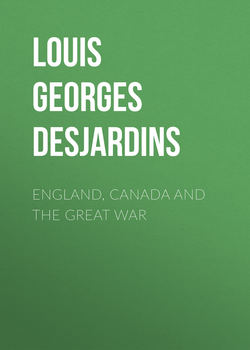Читать книгу England, Canada and the Great War - Louis Georges Desjardins - Страница 8
CHAPTER VI.
What Do We Owe England?
ОглавлениеTo this question raised by Mr. Bourassa, and argued at length by himself in the negative, I answered by a chapter of my book: – "L'Angleterre, le Canada et la Grand Guerre" – "England, Canada and the Great War."
Great Britain, ever since she came to the conclusion that the days of the old colonial policy were passed, and agreed that we should freely govern ourselves, with ministerial responsibility, within the powers set forth in our constitutional charter, has scrupulously respected our political liberty. We have administered our own affairs at our own free will. The Imperial Government never attempted to interfere with the development of our federal politics. They would surely have declined such interference, if it had been asked for.
As long as we form part of the British Empire, it is evident that we owe to England that loyalty which every colony owes to her mother-country. Granted by the Sovereign Power ruling Canada the freest institutions, having the best of reasons to be fully satisfied with our relations with Great Britain, we are in duty bound to be loyal to her flag. We must be true to our allegiance.
We have freely decided to incur the sacrifices we are making for the war. We have so decided because we considered it of the greatest importance, for the future of Humanity, that the German ambition for universal domination be foiled; that the British Empire be maintained; that France should continue a first class Power, as expressed by Mr. Asquith; that before all, and above all, the eternal principles of Right, Justice and Civilization, shall not be trampled upon by the terrific assault of teutonic barbarism. Moreover, we are also in duty bound to judge with fairness England's part in the great society of nations, and, especially, that she plays in the great events of the present crisis. Beyond doubt, a truly loyal Canadian must refrain from poisoning foreign opinion and that of his fellow British subjects against Great Britain in attributing her course to selfish interests, wilfully taking no account of her broad and admirable foreign policy, ever inspired by the steady desire to maintain peace.
In the first mentioned work, Mr. Bourassa lays great stress on the fact that for nearly a century and a half, previous to the South African War, Canada did not participate in the wars of the Empire. He extensively quotes from the documents and the discussions between Canada's representatives and the Imperial Government, respecting the defence of our country, and that of the Empire herself. He concludes by pretending that the result of all these negotiations and conventions was the agreement that Canada would have only to attend to her own defence, and that Great Britain was always obliged to protect us against all outside attacks. From these pretensions he draws the startling conclusion that all those who do not stand by the conventions he did his best to emphasize are doing revolutionary work.
The answer to such extravagant notions is rather plain and easy. There was not the slightest necessity for the Nationalist leader to multiply lengthy quotations to prove what mere common sense settles at first thought: —
First: – That any country, whether it be independent or a colony, must defend itself when attacked by an enemy.
Second: – That a Sovereign State is bound to defend all the territory under its authority and covered by its flag.
But all this has nothing whatever to do with the very different question of Canada's participation, outside her own territory, in a war in which Great Britain is engaged, which participation Canada has freely, deliberately approved and ordered. Such was the case in 1914. The Parliament and the people of Canada at once realized that in the gigantic conflict into which Germany had drawn all the Great Powers of Europe, our future destiny as much as that of England herself was at stake. Without the slightest hesitation, unasked and unsolicited by the Mother Country, we decided that we were in duty bound to do our share to defend the great Empire of which we are a very important component part, and to help saving the world from tyrannical domination.
Much too often giving to words a meaning which they positively cannot convey, Mr. Bourassa argued at length to prove that the agreements, conventions, and understandings arrived at between the Imperial and Canadian Governments, at different dates, were a solemn treaty.
How false and untenable such a pretention is, surely needs no lengthy argument. International Law knows no treaties but those made between Sovereign States. It is most absurd to pretend that a Sovereign State can make a treaty between herself and its own colony. Where is the man with the slightest notion of Constitutional Government who would pretend, for instance, that the British North American Act is a treaty between Great Britain and Canada. It is an Act passed by the Legislative authority of the Sovereign State to which we belong, enacting the conditions under which Canada would enjoy the rights and privileges of constitutional self-government, participating in the exercise of Sovereignty within the limits of the powers enumerated in the Act creating the Dominion. It was precisely because we knew we were acting within the limits of those powers, that we decided to join with England and her Allies in the great war.
